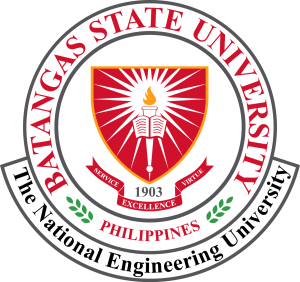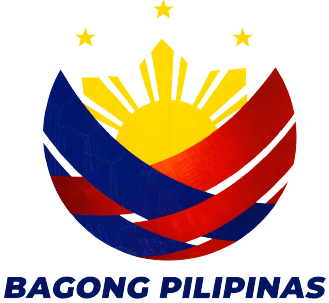Batangas State University’s Engineering Programs achieve Highest Re-Accreditation from Global Accreditor—EAC-ABET
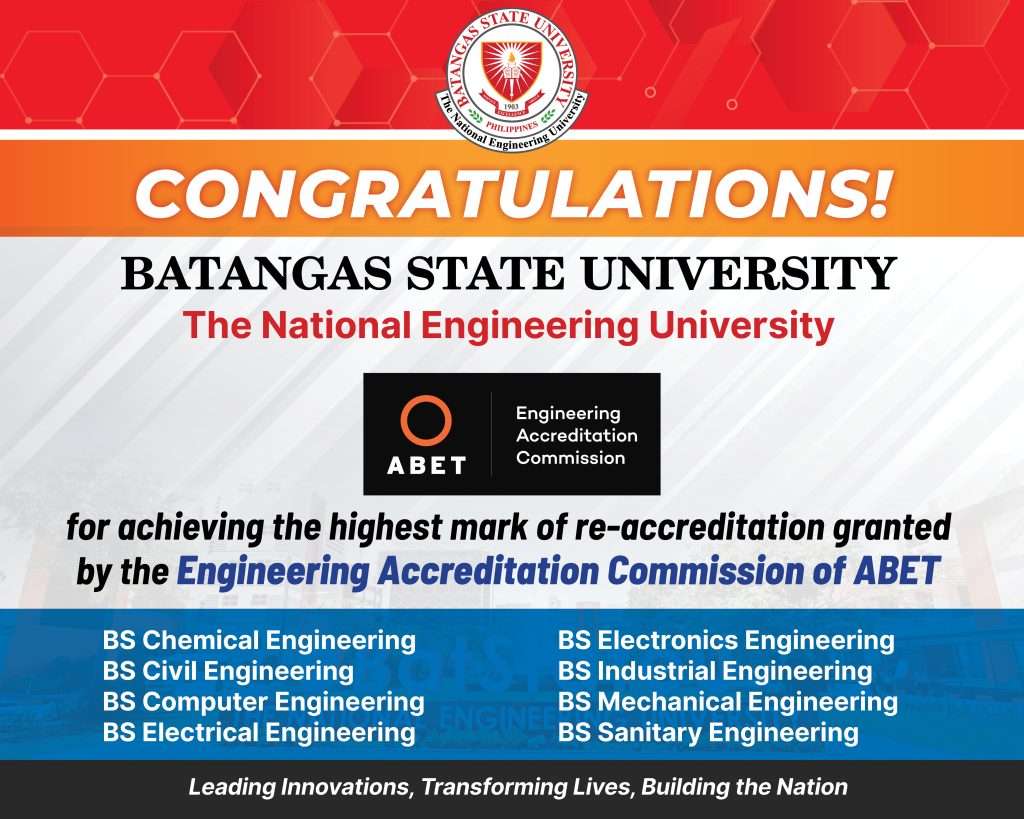
BATANGAS CITY—Batangas State University (BatStateU), recognized as the Philippines’ National Engineering University, proudly announces that eight of its engineering programs have achieved the highest mark of re-accreditation from the Engineering Accreditation Commission (EAC) of the Accreditation Board for Engineering and Technology (ABET). Based in Baltimore, Maryland, USA, ABET is a global accreditor for college and university programs in applied and natural sciences, computing, engineering, and engineering technology. This prestigious accreditation was officially posted on the ABET website on October 1, 2023. The exceptional quality of BatStateU’s engineering programs was underscored by a comprehensive evaluation conducted by experts and representatives from EAC-ABET. These assessments took place during an extensive visit to the Philippines from November 13 to 15, 2022. The outcome reaffirmed the paramount significance of ABET accreditation and verified that BatStateU’s engineering programs consistently meet rigorous standards. These ABET-accredited programs include BS Chemical Engineering, BS Civil Engineering, BS Computer Engineering, BS Electrical Engineering, BS Electronics Engineering, BS Industrial Engineering, BS Mechanical Engineering, and BS Sanitary Engineering. BatStateU, renowned for its engineering education excellence, has produced over 180 engineering board topnotchers, cementing its position as the country’s largest engineering university, offering 46 engineering degree programs, the highest among higher education institutions (HEIs) nationwide. Additionally, the university offers 27 emerging programs in engineering and allied fields, showcasing its dedication to staying at the forefront of educational excellence. Notably, BatStateU is the first and, thus far, the only state university in the Philippines with engineering programs accredited by ABET. “This ABET accreditation serves as a compelling affirmation of BatStateU’s commitment to providing world-class engineering education at par with other global engineering universities. It assures that our graduates from these programs are not only well-equipped to excel in critical technical fields but also primed to drive innovation and proactively meet the imperatives of the global knowledge economy,” University President Dr. Tirso A. Ronquillo shared. Sought worldwide, ABET’s voluntary peer-review process enjoys global recognition for enhancing the quality, precision, and safety of academic programs in technical disciplines. This rigorous assessment is carried out by teams of experts from industry, academia, and government, focusing on evaluating program curricula, faculty expertise, facilities, and institutional support. To check the EAC-ABET accredited programs of Batangas State University, kindly visit this link: https://www.abet.org/. For more information about the Philippines’ National Engineering University, please visit www.batstate-u.edu.ph/about/
Privacy Policy Statement
Privacy Policy Statement PRIVACY POLICY FOR APPLICANTS, STUDENTS, AND ALUMNI This Privacy Policy outlines and discusses how the University collects, uses, or otherwise processes your personal data in relation to your engagement with the University. The University protects your right to privacy. As we seek to balance the privacy of your data while ensuring the free flow of information, we also aim to comply with the requirements of the laws on data protection, its implementing rules and regulations and other applicable laws relating to data privacy. The following privacy policy shall govern the collection, use, storage, and sharing of personal data of applicants, students, and alumni in connection with their application, academic endeavors, and post-graduation engagements with the University: a. Collection, Acquisition, and Generation of Personal Data. The University may collect, acquire, or generate personal data of applicants, students, and alumni in many forms. i. Personal data may consist of written records, photographic and video images, digital material, and even biometric records. ii. Information collected during application for admission includes: (1) directory information, like data subjects’ name, email address, telephone number, and other contact details; (2) data about personal circumstances, such as family background, history, and other relevant circumstances, previous schools attended, academic performance, disciplinary record, employment record, and medical records; (3) any or all information obtained through interviews and/or during entrancetests or admission examinations. iii. Information collected or generated after enrolment and during the course of the students’ stay with the University. After students enroll in the University, additional information about them may be collected, including: (1) academic or curricular undertakings, such as the classes they enroll in, scholastic performance, attendance record, etc. (2) co-curricular matters they may engage in, such as service learning, outreach activities, internship or apprenticeship compliance; (3) extra-curricular activities, such as membership in student organizations, leadership positions, and participation and attendance in seminars, competitions, programs, outreach activities, and study tours; (4) any disciplinary incident that they may be involved in, including accompanying sanctions. There will also be times when the University will acquire other forms of data like pictures or videos of activities students participate in, via official documentation of such activities, or through recordings from closed-circuit security television cameras installed within school premises. iv. Unsolicited Information. There may be instances when personal information is received by the University without prior request (e.g. medical records submitted by students not required for enrollment, anonymous complaints). In such cases, the University shall promptly assess whether the information is necessary and directly related to its official functions or legitimate interests. If the information is found to be irrelevant, unnecessary, or unsupported by a lawful basis for processing, it shall be securely disposed of in a manner that protects the data subject’s privacy. Only unsolicited information that is clearly aligned with the University’s legitimate purposes and meets the requirements of lawful processing under the Data Privacy Act shall be retained and treated in accordance with applicable privacy policies. The mere receipt of unsolicited information shall not be construed as valid consent or as a basis for unrestricted use or processing. b. Use of Information. To the extent permitted or required by law, the University may use the data subjects’ personal data to pursue the University’s legitimate interests as an educational institution, including a variety of academic, administrative, research, historical, and statistical purposes. i. The University may use the information it collected for purposes such as: (1) evaluating applications for admission to the University; (2) processing confirmation of incoming, transfer, cross-registering, or non-degree students in preparation for enrollment (3) recording, generating, and maintaining student records of academic, co-curricular, and extra-curricular progress; (4) recording, storing, and evaluating student work, such as homework, seatwork, quizzes, long tests, exams, term papers, theses, dissertations, culminating or integrating projects, research papers, reflection papers, essays and presentations; (5) recording, generating, and maintaining records, whether manually, electronically, or by other means, of grades, academic history, class schedules, class attendance and participation in curricular, co-curricular, and extra-curricular activities; (6) establishing and maintaining student information systems; (7) sharing of grades between and among faculty members, and others with legitimate official need, for academic deliberations and evaluation of student performance; (8) processing scholarship applications, grants, allowances, reports to benefactors, and other forms of financial assistance; (9) investigating incidents that relate to student behavior and implementing disciplinary measures; (10) maintaining directories and alumni records; (11) compiling and generating reports for statistical and research purposes; (12) providing services such as health, insurance, counseling, information technology, library, sports/recreation, transportation, parking, campus mobility, safety and security; (13) managing and controlling access to campus facilities and equipment; (14) communicating official school announcements; (15) sharing marketing and promotional materials regarding school-related functions, events, projects, and activities; (16) soliciting participation in research and non-commercial surveys sanctioned by the University; (17) soliciting support, financial or otherwise, for University programs, projects, and events; (18) sharing information with persons or institutions as provided below. ii. The University shall consider the processing personal data for these purposes to be necessary for the performance of its contractual obligations to the data subjects, for the University’s compliance with a legal obligation, to protect the data subjects’ vitally important interests, including their life and health, for the performance of tasks the University carries out in the public interest (e.g., public order, public safety, etc.), or for the pursuit of the legitimate interests of the University or a third party. However, considering that the DPA of 2012 imposes stricter rules for the processing of sensitive personal information and privileged information, the University shall fully commit to abiding by those rules. iii. If the University requires the data subjects’ consent for any specific use of their personal data, the University shall collect it at the appropriate time. iv. The University shall not subject the data subjects’ personal data to any automated decision-making process without their prior consent. c. Sharing, Disclosing, and Transferring of Personal Data. To the extent permitted or required by law, the University may also share, disclose, and transfer personal data to other
IoT: Big Data and Analytics

Batangas State University, The National Engineering University
NEWS BatStateU hosts Erasmus+ UNICATION Final Conference, strengthens EU-Asia cooperation on inclusive internationalization November 20, 2025 Public Relations 2:00 pm BatStateU hosts Erasmus+… Read More CALABARZON: Powering Philippine Industrial Growth through Industry-Based Learning at BatStateU LIMA Campus CALABARZON: Powering Philippine Industrial Growth through Industry-Based Learning at BatStateU… Read More BatStateU LIMA Campus champions Industry-Based Learning, redefines Philippine engineering and technology education Batangas State University, The National Engineering University (BatStateU The NEU),… Read More Batangas State University opens LIMA Campus, empowers learners with a full swing of Industry 4.0 lifelong learning opportunities LIPA-MALVAR, BATANGAS—Batangas State University, The National Engineering University (BatStateU The… Read More Load More ANNOUNCEMENTS BatStateUCAT 2026 Online Application opens on August 4, 2025 BatStateUCAT Results for AY 2025-2026 are OUT! Red Spartans against Red Tape: BatStateU The NEU joins Ease of Doing Business Month 2025 ETEAAP Portfolio Submission Deadline – April 21, 2025 Load More
Employability: Career Advising Sessions
CAREER ADVISING SESSIONS One-on-one career advising sessions offered by Batangas State University (BSU), The National Engineering University, play a vital role in the holistic development and future success of its students. These sessions provide personalized guidance and support that goes beyond traditional classroom education, enabling students to make well-informed decisions about their career paths and enhancing their overall employability. The importance of these sessions can be understood from several perspectives: 1. Personalized Guidance: Each student has unique strengths, weaknesses, interests, and career aspirations. One-on-one career advising sessions allow advisors to tailor their guidance to individual students, considering their academic backgrounds, skills, personality traits, and long-term goals. This personalized approach helps students identify career options that align with their strengths and interests, leading to better career satisfaction and success. 2. Clarifying Career Goals: Many students enter university with vague ideas about their future careers. Career advising sessions provide a platform for students to clarify their career goals and aspirations. Advisors can help them explore various career pathways within their field of study, giving them a better understanding of the potential opportunities and challenges that lie ahead. 3. Skill Enhancement: Effective career advising involves assessing a student’s skill set and identifying areas that need improvement. Advisors can suggest specific workshops, training programs, or extracurricular activities that can enhance the student’s skill set, making them more competitive in the job market. This can include communication skills, technical skills, leadership abilities, and more. 4. Resume Building and Interview Preparation: Crafting a compelling resume and performing well in job interviews are critical skills. Career advisors can provide personalized advice on creating effective resumes and cover letters that highlight a student’s strengths and experiences. Additionally, they can offer mock interview sessions to help students develop confidence and improve their interview skills. 5. Industry Insights: Career advisors often have connections with professionals in various industries. They can offer valuable insights into the current job market trends, industry expectations, and emerging opportunities. This real-world information empowers students to align their academic pursuits with the demands of the job market, increasing their chances of securing relevant and meaningful employment. 6. Networking and Mentorship: Career advising sessions can also introduce students to networking opportunities and potential mentors. Advisors can connect students with alumni or professionals who can provide guidance, share their experiences, and offer valuable advice on navigating the complexities of their chosen field. 7. Transition to the Workforce: The transition from university to the workforce can be daunting. Career advisors help ease this transition by providing guidance on job search strategies, networking etiquette, and workplace professionalism. They can also educate students on workplace norms and expectations, ensuring a smoother integration into the professional world. 8. Long-Term Career Planning: Career advising is not just about finding a job after graduation. It’s also about developing a long-term career plan. Advisors can help students set achievable short-term and long-term career goals, guiding them on how to continuously develop their skills and navigate career advancement. In conclusion, the one-on-one career advising sessions offered by Batangas State University hold immense significance for its students. These sessions provide tailored guidance, skill enhancement, industry insights, and support that collectively contribute to the students’ academic and professional success. By empowering students to make informed decisions and equipping them with the necessary skills, these sessions play a pivotal role in ensuring that graduates are well-prepared to excel in their chosen careers.
CTI
General Mandate of the Center The BatStateU CTI focuses on developing programs and activities geared towards creating a sustainable entrepreneurial ecosystem for the university. As an academic institution, the University believes in the importance of adequate and efficient training among budding entrepreneurs to make them competitive in their CTI entrepreneurial endeavor. Programs, Activities, and Projects Collaboration – Community development and partnerships to create a sustainable entrepreneurial ecosystem in the CALABARZON region. Technopreneurship – Integrating Technopreneurship 101 in Engineering, Technology and Computing Science programs and training for faculty to stimulate the entrepreneurial mindset among the academic community of the University. Incubation – R&D outputs and venture ideas from the Technopreneurship classes are incubated to be commercially viable. Notable Projects TBI 4.0: Technology Business Incubator 4.0 for Region 4 Funding Agency: DOST PCIEERD Period: 2019 – Present Budget: Php 13,159,259.00 Development of Southern Luzon Hub for Technopreneurship and Innovation Funding Agency: CHED IDIG Period: 2017 – 2020 Budget: Php 11,997,300.00 Establishment of BatStateU Center for Technopreneurship and Innovation (Technology Business Incubator) Funding Agency: DOST PCIEERD Period: 2016 – 2018 Budget: Php 8,667,596.00 Equipment Available as a Shared Service Facility Co-working Spaces Locator Spaces Photos of the facility
Culture and Arts Webpage
BatStateU-The NEU embraces the Cinematic Journey of Red Spartan Stories through Inspiring Film Screenings Batangas State University, The National Engineering University (BatStateU-The NEU), has continually demonstrated its commitment to academic excellence and cultural enrichment. By embracing the enchanting world of cinema, BatStateU-The NEU has discovered a powerful means of connecting with individuals, fostering inclusivity, and nurturing a culture of peace, love, and unity. As an art form, the film possesses the remarkable ability to transport viewers to alternate realities, evoke deep emotions, and stimulate the boundless realms of human imagination. It captures fleeting moments, weaves intricate narratives, and leaves an indelible impression on the hearts and minds of its audience. One of the most anticipated and exhilarating aspects of the filmmaking process is the long-awaited film screening, where the collective efforts of tireless dedication and meticulous craftsmanship finally unfold before an eager and receptive audience. The 6th edition of the esteemed Sine Kabataan Short Film Lab and Festival, a renowned event organized by the Film Development Council of the Philippines, took place on January 13, 2023. During this prestigious competition, BatStateU-The NEU, in collaboration with the esteemed Teatro Aliwana, showcased their talent through a compelling entry titled “Kung Paanong Hindi,” exploring the poignant theme of abandonment. Although the access did not secure top honors, the Red Spartans demonstrated unwavering gratitude and transformed this experience into a catalyst for future endeavors, igniting their creative spirits to produce films that intimately touch the lives of others and restore the power of connection. BatStateU-The NEU recently hosted “PELIKULAYAG: A Sine Spartan Film Festival 2023 – A Voyage of New Horizons, Stories, and Dreams.” This monumental filmmaking project served as a platform for communication students to showcase their exceptional talent by crafting thought-provoking films that evoke emotions, captivate audiences, and inspire tangible action. This event aimed to revitalize the spirit of the Red Spartans, reconnect with audiences on a profound level, and leave a lasting impact. BatStateU-The NEU firmly believes that film is a transcendent medium that bridges cultural divides, initiates meaningful conversations, and cultivates empathy. This timeless cultural belief remains firmly rooted in the institution’s ethos of nation-building and transforming lives. By harnessing the power of film screenings and the art of filmmaking, the University realizes the extraordinary potential to effect positive change, as a single cinematic narrative possesses the transformative ability to inspire, enlighten, and shape society.
Batangas State University, The National Engineering University, soars high in the THE Impact Rankings 2023
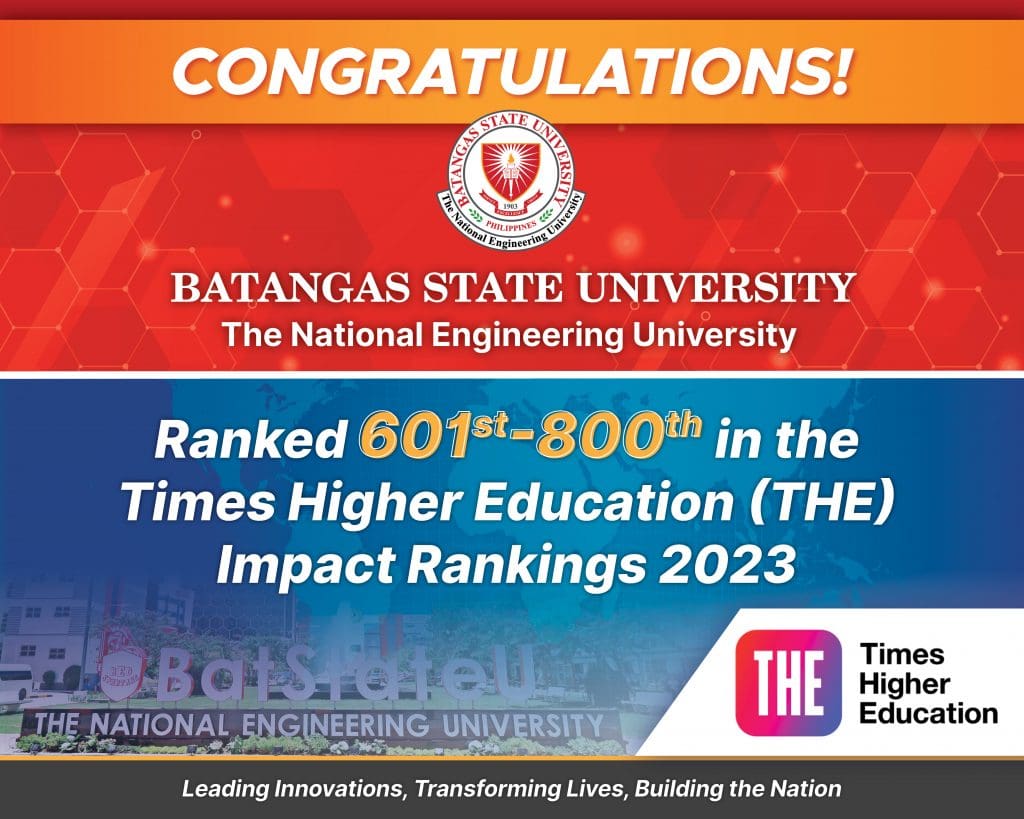
On the heels of its recent recognition in the Top 100 Global Innovative Universities, Batangas State University, The National Engineering University secured a 601st-800th spot among 1,591 universities from 112 countries/regions in the Impact Rankings of the Times Higher Education (THE), released June 1, 2023. It emerged 4th highest-ranked University among universities in the Philippines. The THE Impact Rankings is the first global attempt to measure the contributions of universities worldwide to the 17 UN Sustainable Development Goals (SDGs) through research, stewardship, outreach, and teaching. The University is recognized for its significant initiatives in advancing SDG 14 (Life Below Water), crediting especially the University’s efforts in protecting, conserving, and strategically managing the Verde Island Passage (VIP), landing in the Global Top 200 most impactful programs. Meanwhile, BatStateU-The NEU’s programs in contributing to SDG 2 (Zero Hunger), SDG 5 (Gender Equality), SDG 6 (Clean Water and Sanitation), SDG 12 (Responsible Consumption), and SDG 15 (Life on Land) have been recognized as some of the world’s best initiatives, ranking within the Top 400. BatStateU-The NEU is ranked in all 17 SDGs, thereby affirming its position as one of the leading institutions of higher learning that contributes to attaining the global goals. BatStateU-The NEU’s ranks in the other SDGs are: Top 600 in SDG 13 (Climate Action), and Top 800 in SDG 4 (Quality Education), SDG 8 (Decent Work and Economic Growth), SDG 10 (Reduced Inequalities), SDG 11 (Sustainable Cities and Communities), and SDG 16 (Peace, Justice, and Strong Institutions). The University is also acknowledged in the Top 800+ in SDG 9 (Industry, Innovation, and Infrastructure) and among the Top 1000 in SDG 3 (Good Health and Well-Being). “As the University receives this third international recognition of our efforts to engineer a sustainable world, along with UI GreenMetric and World University Ranking for Innovations (WURI), our commitment to make a lasting impact not only in the country but all over the world is intensified. We are more determined to put forward innovative programs designed to strategically address the pressing needs of today while upholding the importance of safeguarding future generations,” asserted Dr. Tirso A. Ronquillo, University President. Batangas State University is the Philippines’ National Engineering University, by virtue of R.A. 11694, and is a Level IV State University. Regarded as the country’s largest engineering university, BatStateU-The NEU is the first and thus far the only state university in the Philippines with engineering, IT, and computer science programs accredited by the Accreditation Board for Engineering and Technology (ABET) – Engineering Accreditation Commission and Computing Accreditation Commission. The University was recently ranked 351st Most Sustainable University in the world by the UI GreenMetric World University Rankings in 2022 and the 90th Most Innovative University globally by WURI earlier this 2023. For the full rankings and methodology of the THE Impact Rankings, detailed information can be accessed at the THE Website.
BatStateUCAT Results for AY 2023-2024 are OUT!

𝗕𝗮𝘁𝗦𝘁𝗮𝘁𝗲𝗨𝗖𝗔𝗧 𝗥𝗲𝘀𝘂𝗹𝘁𝘀 𝗳𝗼𝗿 𝗔𝗬 𝟮𝟬𝟮𝟯-𝟮𝟬𝟮𝟰 𝗮𝗿𝗲 𝗢𝗨𝗧! Attention incoming first-year students! The long-awaited BatStateUCAT results for the Academic Year 2023-2024 are now available. To access your admission results, simply visit your portal at https://dione.batstate-u.edu.ph/batstateucat/portal/#/. Make sure you have your application number and PIN ready. Click the GO button to view your admission results. Please remember to maintain the confidentiality of your application number and refrain from sharing it with anyone. Safeguarding your personal information is of utmost importance. For any inquiries or further assistance, you can reach us through: Email: tao@g.batstate-u.edu.ph Telephone: (043) 980-0385 local 1148 𝘊𝘰𝘯𝘨𝘳𝘢𝘵𝘶𝘭𝘢𝘵𝘪𝘰𝘯𝘴, 𝘴𝘶𝘤𝘤𝘦𝘴𝘴𝘧𝘶𝘭 𝘢𝘱𝘱𝘭𝘪𝘤𝘢𝘯𝘵𝘴! 𝘠𝘰𝘶𝘳 𝘫𝘰𝘶𝘳𝘯𝘦𝘺 𝘵𝘰 𝘨𝘳𝘦𝘢𝘵𝘯𝘦𝘴𝘴 𝘴𝘵𝘢𝘳𝘵𝘴 𝘩𝘦𝘳𝘦 𝘢𝘴 𝘸𝘦 𝘭𝘦𝘢𝘥 𝘪𝘯𝘯𝘰𝘷𝘢𝘵𝘪𝘰𝘯𝘴, 𝘵𝘳𝘢𝘯𝘴𝘧𝘰𝘳𝘮 𝘭𝘪𝘷𝘦𝘴, 𝘢𝘯𝘥 𝘣𝘶𝘪𝘭𝘥 𝘰𝘶𝘳 𝘯𝘢𝘵𝘪𝘰𝘯 𝘵𝘰𝘨𝘦𝘵𝘩𝘦𝘳. #PropellingTransformations #andAcceleratingReforms #forNationalDevelopment
The National Engineering University, now in the List of Top 100 Innovative Universities in the World
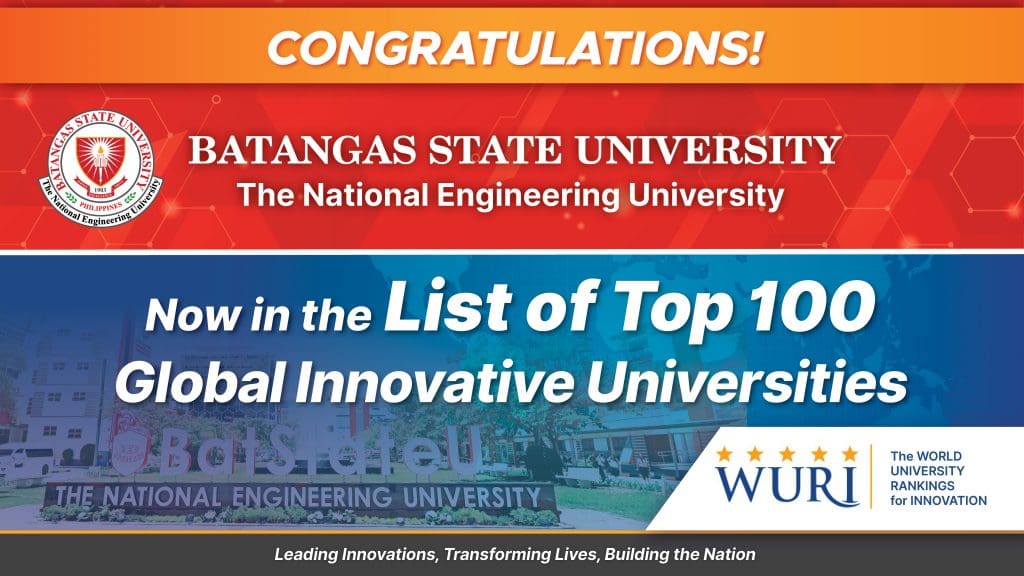
True to its dictum “Leading Innovations”, Batangas State University, The National Engineering University (BatStateU-The NEU) was recognized as the 90th most innovative university in the globe by the prestigious World University Rankings for Innovation (WURI) 2023. As a ranking system that evaluates the university’s real contributions to the society, highlighting creative and innovative approaches of universities’ research and educational programs, WURI 2023 has taken cognizance of the University’s innovative programs and initiatives such as: the Knowledge, Innovation and Science Technology (KIST) Park, Verde Island Passage Center for Oceanographic Research and Aquatic Life Sciences (VIP CORALS), and Center for Sustainable Development (CSD) which all entered in the global top 50 in the fourth industrial revolution (27th), ethical value (31st), and student mobility and openness categories (47th). “More than global recognition, this milestone affirms our strong commitment to making lasting impact to the society and engineering the future towards national development. Aggressively, we will continue leading innovations, transforming lives, and building the nation through our pioneering and impactful programs and initiatives”, said Dr. Tirso A. Ronquillo, University President. Other innovative programs and projects of the University which were instrumental in securing its WURI 2023 spot are the Adaptive Capacity-building and Technology Innovation for Occupational Hazards and Natural Disaster (ACTION) Center, and Center for Technopreneurship and Innovation (CTI) which are under the crisis management and entrepreneurial spirit categories respectively. Just last January, the BatStateU-The NEU ranked as the 351st most sustainable university in the world under the 2022 UI GreenMetric World University Rankings which reflects the University’s strong commitment to contribute to a more sustainable world. The full results of the 2023 World Rankings of Innovative Universities are available at this link: www.wuri.world/wuri-ranking-2023. #LeadingInnovations #TransformingLives #BuildingtheNation

